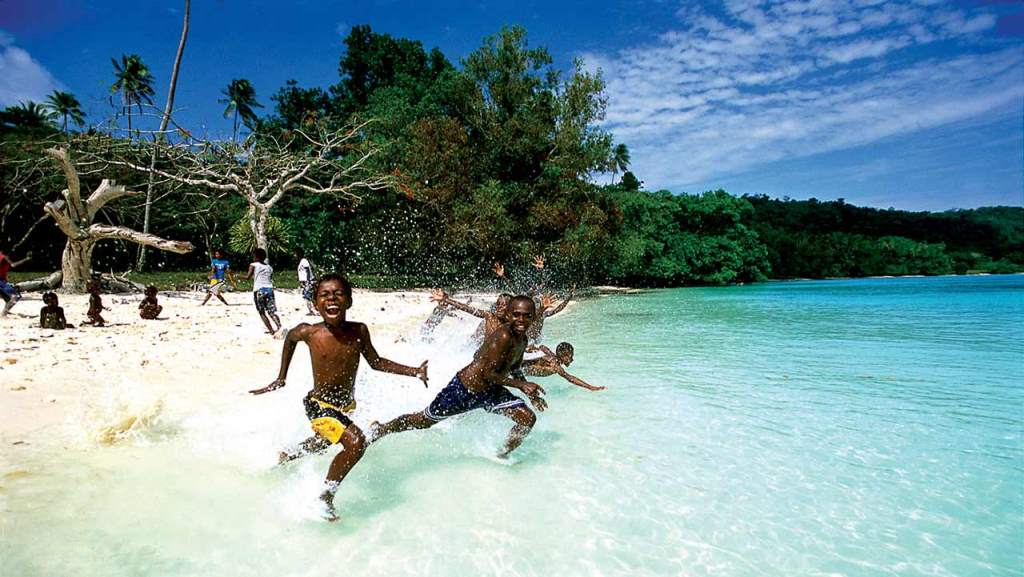Vanuatu 2030: The People’s Plan – an inclusive vision for development
A validation draft of the Government of Vanuatu’s vision for development to 2030 was presented to the public and private sector leaders, chiefs and civil society representatives on Wednesday 16 November in Port Vila, Vanuatu.

Photo: IUCN Oceania
Called “Vanuatu 2030: The People’s Plan”, the Vanuatu National Sustainable Development Plan (NSDP) serves as the country’s highest level policy framework, and provides an inclusive, holistic and comprehensive vision of a stable, sustainable and prosperous Vanuatu. The NSDP was developed using consultative approach that was comprehensive and open ended, a forward thinking change from the usual methods of planning and policy development.
Under the leadership of Gregoire Nimbtik, the Director of the Department of Strategic Policy, Planning and Aid Co-ordination (DSPPAC), teams travelled the length of the country, from Aneityum to the Torres Islands, and consulted in detail with nearly 1,500 men and women in groups of about 50 at a time. Extensive consultations also took place with community and elected representatives, the private sector and civil society.
The Prime Minister of Vanuatu, Charlot Salwai was committed to the NSDP being owned by the people, and the Prime Minister noted that “this is the first time Government is consulting with communities in its national development plans.”
The NSDP also reflects the resounding call from the Ni-Vanuatu for a balance between the social, environmental and economic pillars of sustainable development, with their cultural heritage as the foundation of an inclusive society. Its predecessor, the Priority Action Agenda, was largely a financial management plan, with five of out of the seven top level priorities being focused on financial and economic management, whilst the other two priorities of education and health were chiefly articulated in economic terms.
In 2013, Vanuatu changed the way it talked about development, expanding from a narrow outlook that focused on financial profit, to one that included the other two “P’s” of the triple bottom line approach, the ‘planet’ and ‘people’. In other words, Ni-Vanuatu culture and environment were formally included into the dialogue on national planning, an equal footing with economic considerations, issues and opportunities, or as the NSDP expresses “the people and place are at the very heart of our development aspirations.”
IUCN Oceania is privileged to have played a role in Vanuatu’s shift to a more inclusive, holistic dialogue on national planning, with its Green Growth Leaders Coalition (GGLC) engaged in and supporting the development of this change in approach during 2013.
What has happened in Vanuatu is akin to the Green Economy and Green Growth principles that have or are being incorporated into national development planning in other Pacific Island countries, including in Fiji, Papua New Guinea and Tonga where the GGLC, part of the IUCN Pacific Centre for Environmental Governance, has and continues to play a supporting role.
Rather than a mission document, DSSPAC Director Gregoire Nimbtik views the NSDP as “the nakamal (a traditional meeting place in Vanuatu) where our national development discussions will take place”, and a map that sets out “the borders of the development debate”.
With this in mind IUCN Oceania Regional Director, Taholo Kami acknowledged “the importance of ongoing support from IUCN and other development partners to implement the NSDP, support that aligns with the vision and goals of the people of Vanuatu.”
As noted in Vanuatu Business Magazine, the NSDP is groundbreaking: “for the first time in Vanuatu - indeed, in the developing world - we are seeing environmental issues formally included into the national strategic dialogue.”
This is a plan, a step in a journey, worth celebrating, and in the words of Mr Kami “congratulations are due to the government and people of Vanuatu, for pausing to reflect, to engage with each other, and to chart a new course for development, one that is owned and driven by the Ni-Vanuatu, and that has people and the environment at its heart”.
For more information contact:
Dawn Gibson, Communications and Research Officer, IUCN Pacific Centre for Environmental Governance. Email: dawn.gibson@iucn.org, Phone: +679 331 9084
About the GGLC
The Green Growth Leaders Coalition (GGLC) is a coalition of leaders from across the Pacific Islands who are committed to the sustainable development and growth of the region. Members include Heads of State, ministers and politicians, religious leaders, senior academics, the leaders of CROP and other regional agencies, and leaders from business and civil society.
The GGLC enables inclusive conversation and collaboration between leaders and decision makers across organisational, sectoral, national and political boundaries. Convened and facilitated by the IUCN Pacific Centre for Environmental Governance, the GGLC is supported by the Pacific Leadership Program, an initiative of the Australian Department of Foreign Affairs and Trade.
